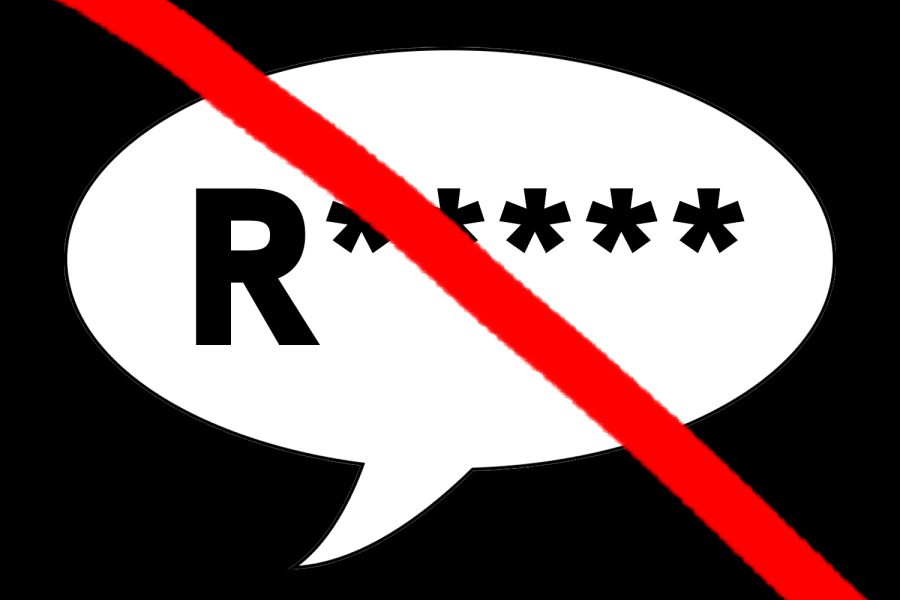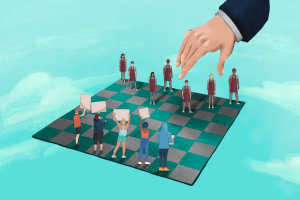Words matter: Stop using the r-word
Graphic illustration by Sunny Li
The r-word is hurtful and offensive toward people with intellectual and developmental disabilities, and it should not be part of our vocabulary.
March 10, 2021
People using the r-word, which stands for retarded, often do not recognize the harm that they cause by their language. The r-word should be taken more seriously for what it is: hate speech. It is hurtful and offensive to people with intellectual and developmental disabilities (IDDs) and should not be part of everyday language, as it further perpetuates discrimination against neurodivergent people.
Although the r-word was originally a neutral medical term, it is now used colloquially as an insult meaning “stupid” or “idiot,” not always directed toward those with intellectual disabilities. The word has been retired out of the official context, particularly following Rosa’s Law in 2019, which changed mentions of “mental retardation” to “intellectual disability” in U.S. federal documents, strongly signalling that using these words is not acceptable.
Using the r-word as a derogatory term equates having an IDD to an insult, which further emphasizes the negative stereotypes around neurodivergent people as lesser than neurotypical people. While some defend their behavior as simply a joke, words matter greatly in shaping opinion and conversation.The r-word denies the human dignity of people with IDDs, because they are only seen for their diagnosis, rather than recognized as multifaceted individuals.
“They don’t want to be seen as somebody who is less capable than others,” Viking Buddies officer Alyssa Eseroma said. “They don’t want to be defined by their disability, so it is important to really reflect on how the r-word affects disabled people.”
Similarly, distorted and negative representations of IDDs in the media are another way that these individuals are not accurately represented and further separated from society. For instance, the recent movie “Music” focuses on the growth of Music’s neurotypical sister, and Music, the girl who is on the autism spectrum, serves to motivate her sister’s development. By not centering the story on Music, the movie feeds into the damaging archetype of people with disabilities as props for the growth of others, instead of showing that people of all abilities can learn and grow. Portrayals like this reinforce the divide between neurotypical and neurodivergent people as the latter group are not perceived as ordinary people deserving to be treated in the same way.
Clubs and organizations such as Friends of Children with Special Needs and Viking Buddies seek to bridge that gap by creating a space to normalize neurodiversity. Students interact and have fun together on a person-to-person basis.
“They’re teenagers too,” Viking Buddies officer intern Lucy Barnes said. “They’re just like us, and I think it’s really important that the point of Viking Buddies is just to hang out with other teenagers. There aren’t two groups. It’s completely integrated, and it’s really just a time to spend time and normalize everyday interactions.”
Increased interaction in all classrooms can help break down barriers; talking to students of all abilities makes everyone more comfortable around each other and increases mutual understanding. Lynbrook can also be made more inclusive through education about IDDs and the hurtful effects of using the r-word, such as through homeroom activities and discussions.
“Similar to how we’ve been discussing systemic racism in our classroom, it would be helpful for homerooms to open that up to other forms of discrimination that we see in our everyday lives and teaching students about that,” Eseroma said. “I think is also really important, because there are many different types of discrimination that we have yet to really address in a classroom environment.”
To combat the use of the r-word, Viking Buddies collaborated with other clubs from FUHSD in an anti-ableism video to be shown in homeroom, which seeks to educate people about the r-word and promote inclusion. On a larger scale, Spread the Word is a global campaign that has gathered 800,000 pledges to spread inclusion. The campaign began as Spread the Word to End the Word, which worked toward eliminating the r-word through encouraging pledges, as they recognized the importance of using inclusive language as a concrete change to work toward.
“Using language that feels more inclusive helps everyone come closer together as a community, because if you’re alienating a specific section of the school for being different, that just overall has a negative effect on the school and makes everyone further apart,” Friends of Children with Special Needs volunteer Daniel Wang said. “If we use more inclusive language, it will definitely have a positive impact on the school and make it a much safer and happier environment.”
One specific way is to use people-first language to refer to people with disabilities, physical or intellectual, as that places the focus on the person, rather than their condition. For example, “person with autism” should be used rather than than “autistic person.”
The r-word is not a joke, and its usage should be taken seriously and addressed. Speaking out when friends, peers and others in the Lynbrook community use the r-word, whether they are aware of the hurt it causes, can help educate others and change the environment on the local level to be more inclusive for all.





























































m3 • Feb 27, 2024 at 12:02 am
Retarded has much more deeper meaning than that, retard.
Star • Nov 30, 2022 at 1:47 pm
Just would like to throw in a minor correction, as an autistic person. That part at the end about “person first language” is generally incorrect in the autism community. We prefer to be referred to as autistic persons. We are not people with autism, we are autistic people.